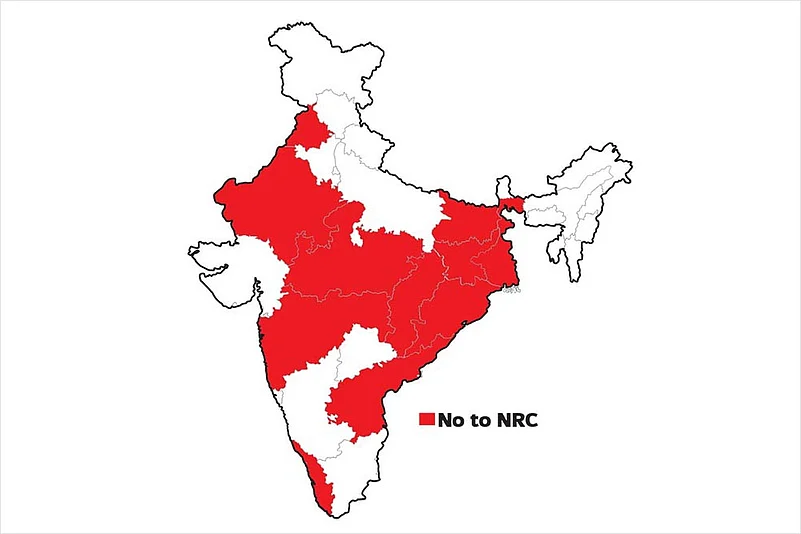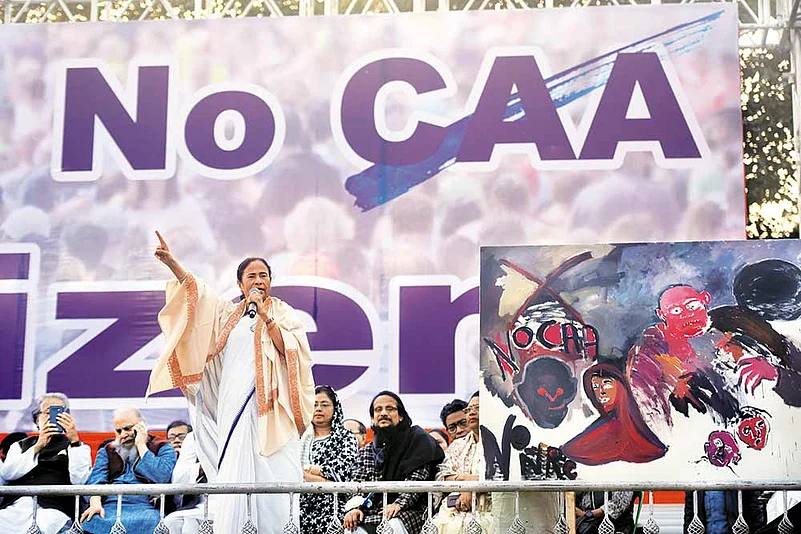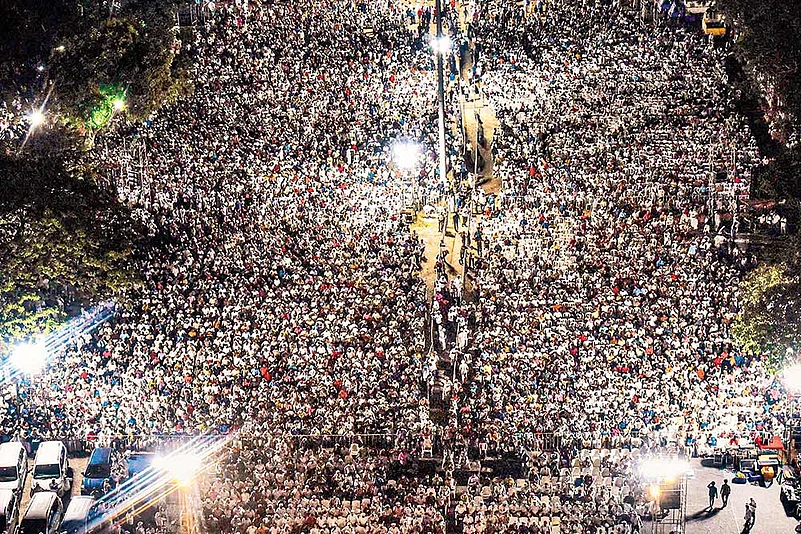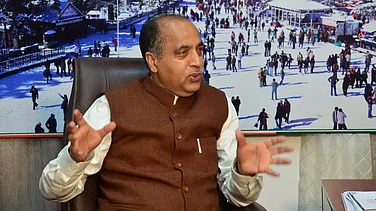Call it the inflection point—on December 11, 2019, when Parliament passed the Citizenship (Amendment) Bill (CAA), it also opened up the divisions along religious, ethnic and linguistic lines. When young India hit the streets in protest against the combination of the amended citizenship law and the proposed National Register of Citizens (NRC), their demands found resonance with many state governments. This may be the first time that chief ministers of at least 11 states have come together to oppose a central legislation. These 11 states make up 56 per cent of India’s population, and some are ruled by allies of the BJP.
Moving the Supreme Court to get CAA declared unconstitutional and in violation of Articles 14 and 21, Kerala’s CPI(M)-led Left Democratic Front government was the first to challenge the amended law. The Kerala assembly had also passed a resolution last month, demanding CAA be scrapped. CM Pinarayi Vijayan has written letters to several chief ministers, including Bihar CM Nitish Kumar and Odisha CM Naveen Patnaik, urging them to reject the Centre’s moves on CAA, NRC and the National Population Register (NPR). Vijayan told Outlook in a recent interview that the states will assert themselves and resist when federal aspirations are overlooked. “In a federal structure such as ours, state governments are necessary for the smooth functioning of our polity. They can’t just be wished away. The Centre should try to have meaningful engagements with them and learn from them,” he said.
West Bengal and Kerala were the first states to stop the updating of NPR, forcing other state governments to take a stand. Continuing to exert pressure on the government, 20 opposition parties recently passed a resolution calling on the government to withdraw CAA and stop the NPR and NRC exercises. The Congress, which is in power in seven states, upped the ante by asking the non-BJP states to adopt a resolution to suspend the NPR exercise, calling it as a prelude to NRC. Congress spokesperson Sanjay Jha says the country is likely to witness a bitterly contested federal showdown this year. “The Congress will strongly oppose the laws in the states where we are in government. Without the support of the states, the central government cannot bulldoze its way with autocratic diktats,” he adds.

Facing stiff opposition from even NDA allies on implementing NRC and NPR, the BJP is struggling to keep its flock together. Thanks to massive protests and regional compulsions, the Shiromani Akali Dal and the JD(U) took a U-turn on CAA and NRC, though they voted for the bill in Parliament. Nitish Kumar said he is willing to have a debate on CAA, while categorically refusing to implement NRC in Bihar. After the party supported CAA in Parliament, senior leaders Prashant Kishor and Pavan Varma openly opposed NRC and NPR.
JD(U) general secretary K.C. Tyagi says that if the NPR requires people to declare the “date and place of birth of both parents”, then the party will look into it. “If NPR is linked with NRC and CAA, then we won’t accept it. There wouldn’t be any meaningful NPR when a large number of people from the weaker sections of society have no ration card, no land and no permanent address,” he adds.
Tyagi also accuses the BJP of being unwilling to consult its allies. “It is detrimental to the federal structure. This wasn’t the case during the time of Atal Behari Vajpayee. The BJP has to take allies into confidence in any policy implementation,” he says. According to Trinamool Congress MP Saugata Roy, the resistance of states is a result of the BJP’s aggressive push towards maximum centralisation of powers since 2014. “States are resisting government policies that take forward this centralising tendency. It’s early to say this is a turning point in taking on majoritarianism. But this is an important time,” says Roy.
Balveer Arora, a scholar of federalism, says the steps taken by the state governments can be described as “uncooperative federalism”. Arora, a former JNU professor, describes uncooperative federalism as states using the instruments available through the federal power structure. “States are also going to use whatever means are available to them at the implementation stage of the law. They may also explore where they can put the process in hibernation,” he adds. Though the citizenship law is in the domain of central government, Arora says that if the states mobilise sufficient numbers to move the Supreme Court, then it will be compelled to accept that petition,” says Arora.
It’s not that all is hunky dory in the opposition camp. The fractured unity of the opposition parties was in display at the recent meeting of 20 parties where the Samajwadi Party, Mayawati’s Bahujan Samaj Party, Trinamool chief Mamata Banerjee and Arvind Kejriwal of the Aam Aadmi Party were conspicuous by their absence. Roy says it’s not necessary to put on a show of unity in opposing the Centre. “The states may act together or separately, but it’s possible. Our position is very clear on this,” says the Trinamool leader.

Mamata Banerjee addresses a rally against CAA-NRC in Calcutta.
Political analyst Manisha Priyam is of the view that states shouldn’t enter into a clash with the Centre on citizenship as it is entirely a central government issue. “The chief ministers can have discussions with the Centre. There’s a variation in responses between different states. In a federal setup, if the chief ministers want a discussion, the central government should concede their demand,” she says.
Odisha, whose ruling party supports the BJP, has taken a diplomatic approach: Yes to CAA, no to NRC and yes to NPR. That is how the Biju Janata Dal (BJD) has navigated the choppy waters on the contentious citizenship issue so far. When Parliament voted on CAA last December, the BJD had sought an amendment—inclusion of Sri Lanka in the list of nations whose persecuted religious minorities are to be given citizenship under the act. The demand was rejected by the government, but that did not stop the BJD from voting for CAA.
That’s why it came as a surprise for many when Naveen Patnaik announced on December 18 that his party would not implement NRC in Odisha. The decision followed a rally by Muslim organisations in Bhubaneswar the previous day against CAA and NRC. The protesters made no secret of their disillusionment with Naveen for “letting them down”. “We had voted for him overwhelmingly in the last elections since we thought he was a secular leader like his father. Now, we feel cheated,” one of the leaders said at the rally.
Earlier, on December 13, a delegation of Muslim leaders had met the Odisha CM and BJD leader to express concern over the amended citizenship law. Naveen tried to allay their apprehensions and explain his support for CAA by reiterating the point PM Modi and Union home minister Amit Shah have sought to make for weeks now: that “CAA will not affect any Indian citizen”. It was, in fact, after the Kerala CM wrote to other CMs that the central government announced a 45-day schedule for the NPR exercise in the state, starting on April 15.
In Tamil Nadu, though the AIADMK-led government, in which the BJP is also a constituent, has declared unequivocal support to CAA, NPR and NRC, its partner Pattali Makkal Katchi (PMK) has expressed dissent. The PMK, which supported the amendment to the citizenship law in Rajya Sabha, came out against implementing NRC, saying it would create “unnecessary apprehension and tension” among people.
Meanwhile, the two Telugu states, Telangana and Andhra Pradesh, are playing wait-and-watch on NPR. After supporting CAA in Parliament, Y.S. Jaganmohan Reddy’s ruling YSR Congress Party in Andhra has done a volte face on NRC. In Telangana, the ruling Telangana Rashtra Samiti (TRS) of K. Chandrasekhar Rao chose to abstain from voting on CAA in both Houses of Parliament, and he is yet to make his stand clear on NRC and NPR. “We have already expressed our reservations on CAA by abstaining in Parliament. What else you expect from us to say?” asks TRS general secretary K. Keshava Rao.
By Preetha Nair With inputs from Sandeep Sahu in Bhubaneswar, G.C. Shekhar in Chennai and M.S. Shanker in Hyderabad


























